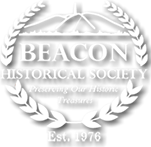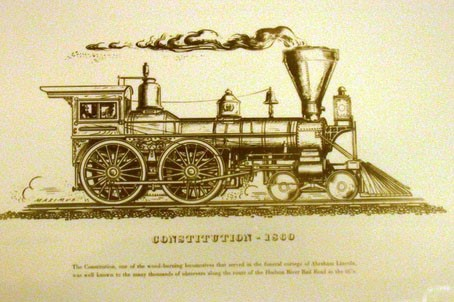The Lincoln Connections to Beacon
February 19th 1861 President Lincoln's Inaugural Train stops in Fishkill Landing
Walt Whitman, himself a spectator amidst the waiting crowds at the 30th Street Station of the Hudson River Railroad in New York City, described the appearance of the new President when he alighted from his inaugural train:
“From the top of the omnibus I had a capital view of Mr. Lincoln: his looks and gait; his perfect composure and coolness; his unusual and uncouth height; his dress of complete black; stovepipe hat pushed back on his head; dark brown complexion; seamed and wrinkled yet canny-looking long neck; and his hands held behind, as he stood observing the people.”
About two hours earlier, and 60 miles north of 30th Street, the crowds at the Fishkill Landing depot would have witnessed a similar but more modest version of the same happening, and the same likenesses of the Lincoln witnessed by Whitman a few hours later. The date was February 19, 1861. The occasion was the Albany-to-New York leg of the 12-day, whistle-stop train journey of the new President as he traveled from Illinois to his Inauguration in Washington. From Albany, the inaugural train made stops that day at Hudson, Rhinebeck, Poughkeepsie, Fishkill Landing and Peekskill. At Fishkill Landing depot the Lincoln Special arrived about 1:30 that afternoon, pulled by Hudson River Railroad’s newest locomotive--The Constitution, which was “all decorated with the American colors and lithograph portraits of Lincoln on each side of the cab.” Lincoln emerged from the train and addressed the crowd:
”I appear before you not to make a speech. I have no sufficient time, if I had the strength, to repeat speeches at every station where the people kindly gather to welcome me as we go along. If I had the strength, and should take the time, I should not get to Washington until after inauguration, which you must be aware would not fit exactly. (Laughter.) That such an untoward event might not transpire, I know you will readily forgo any further remarks; and I close by bidding you farewell.“ —The New York Tribune.
As can be imagined, Lincoln’s appearance here, for many, was a life moment—one to be remembered and recounted into old age. John Schouten, who grew up in Matteawan, is one who had a treasured memory of that event, even carried in pride to his death day: when he died in 1938, at the age of 86, his obituary notice in the Beacon News noted that as a boy of nine years old he shook Abraham Lincoln’s hand at Fishkill Landing. [How he got close enough to the train to do so must have been a story in itself.]
Four years later, on April 25, 1865, the scene with the Lincoln Special played out again at the Fishkill Landing depot, a scene this time not of joy but of tragic sorrow. For it was Lincoln’s funeral train that now passed by, guided by the same two locomotives, the Union and the Constitution of the inaugural railroad journey of four years earlier. Carl Sandburg (biographer of Lincoln) noted how the village of Fishkill Landing had decorated its depot with a sign made up of boughs of evergreens in honor of the slain president: “Fishkill evergreened its motto ‘In God We Trust,’” Sandburg wrote, [and] “crowded both sides of the tracks; across the Hudson River General George Washington’s headquarters had flags with mourning signs. Here too [at Fishkill] were delegations from Newburgh, New Paltz, and other parts of the apple country immediately across the river.”
Viewed in the context of national events, Lincoln’s journeys through Beacon rank high in local historical importance for us. And not to be discounted was the drama and emotion experienced that day by our ancestors Fishkill Journal, April 27, 1865 “An immense throng of people were present at the depot [in Fishkill Landing], to witness the passage of the train conveying the remains of our late President, Abraham Lincoln. The slow tolling of the muffled bells, the draped flags and somber hangings everywhere, the solemn dirge played by the band, and the sad countenances of the assembled multitude, rendered the scene one long to be remembered.”
Another Beacon Connection to Lincoln ...
Boston Corbett, the man who killed John Wilkes Booth, Lincoln's assassin,once lived and worked in Matteawan. Shortly after Lincoln's death, our community's local paper, the Fishkill Standard, printed this brief, cryptic article:
"Boston Corbett, the sergeant who shot Booth, the assassin of President Lincoln, formerly resided in Matteawan (now Beacon), and worked for the Seamless Clothing Company. He was connected with the Protestant Methodist Church of the village, and was known as an ardent and zealous Christian, if not a fanatic. He was always singing."
But just when the slightly mad Boston lived here remains a mystery. A letter about Corbett written by local resident Joseph Coldwell to the local editor in 1902 tells us more:
"His name was not 'Boston' but Thomas Corbett. He was short in stature, [and] he was of light complexion, but he did part his hair in the middle. He had the letters "T.C." tattooed on his arm, and when asked to explain, said he was converted in Boston, and like Saint Paul after his conversion, changed his name He was a wool hatter by trade and worked for John Falconer, who conducted business of the Seamless Manufacturing Company on the west side of the Fountain Street Bridge [now one East Main Street], where I learned my trade, and which now [1902] is the Carroll Hat Works. He was overzealous religiously. He taught a Bible class, of which I was a scholar, in the Union Sunday School. He shot Booth without orders, and was praying when he pulled the trigger. The money he received for the act was all given to Christian Societies, and he died poor and almost friendless. He was a strong trade union man, and used the strongest most pointed language, I think, that I ever heard an employee use on any occasion when he was appointed on a committee to wait upon the bosses."
Therefore, at some time before 1861, Boston Corbett, one of the most enigmatic characters of the Civil War, once worked and prayed here in Beacon.
Thomas Corbett



